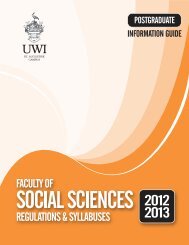Faculty of Humanities and Education (Postgraduate) - The University ...
Faculty of Humanities and Education (Postgraduate) - The University ...
Faculty of Humanities and Education (Postgraduate) - The University ...
Create successful ePaper yourself
Turn your PDF publications into a flip-book with our unique Google optimized e-Paper software.
58<br />
POSTGRADUATE REGULATIONS & SYLLABUSES 2012 - 2013<br />
THE FACULTY OF HUMANITIES & EDUCATION<br />
Goals<br />
<strong>The</strong> goals <strong>of</strong> the programme are that persons who are embarking<br />
on careers as secondary school teachers will:<br />
• respond effectively to the challenges <strong>of</strong> teaching in societal<br />
contexts <strong>of</strong> rapid change;<br />
• willingly <strong>and</strong> confidently assume their roles <strong>and</strong><br />
responsibilities in the schools to which they are assigned;<br />
• make pr<strong>of</strong>essional choices that are informed by clearly<br />
defined personal philosophies <strong>of</strong> education;<br />
• seek to foster the holistic development <strong>of</strong> all students;<br />
• demonstrate the necessary attitudes, skills, <strong>and</strong> knowledge<br />
to support their pr<strong>of</strong>essional practice;<br />
• act as change agents in their schools <strong>and</strong> communities;<br />
• collaborate with others to access,develop,<strong>and</strong> disseminate<br />
information about best educational practice; <strong>and</strong><br />
• commit themselves to continuous pr<strong>of</strong>essional<br />
development throughout their teaching careers.<br />
General Objectives<br />
Participants who have successfully completed this programme<br />
will be able to:<br />
• recognise all students’potential to learn;<br />
• respond effectively to the special needs <strong>and</strong> interests <strong>of</strong><br />
adolescent learners;<br />
• demonstrate respect for the social <strong>and</strong> cultural experiences<br />
<strong>of</strong> their students;<br />
• respond flexibly to the challenges <strong>of</strong> practising in different<br />
school <strong>and</strong> classroom contexts;<br />
• plan <strong>and</strong> implement instructional activities in their own<br />
areas <strong>of</strong> content specialisation so as to promote the holistic<br />
development <strong>of</strong> students;<br />
• plan instructional activities that are informed by their<br />
underst<strong>and</strong>ing <strong>of</strong> sound educational aims <strong>and</strong> purposes;<br />
• align their curriculum with established curriculum policies<br />
<strong>and</strong> st<strong>and</strong>ards;<br />
• use appropriate technologies to support teaching <strong>and</strong><br />
learning in their content areas;<br />
• establish classroom climates that support students’ holistic<br />
development;<br />
• use their knowledge <strong>of</strong> students’ previous experiences to<br />
promote effective learning;<br />
• plan, carry out, <strong>and</strong> use research to evaluate <strong>and</strong> inform<br />
their pr<strong>of</strong>essional practice;<br />
• reflect on their own teaching philosophy <strong>and</strong> practice, <strong>and</strong><br />
on ways in which these might be refined;<br />
• critically interrogate dominant educational policies <strong>and</strong><br />
practices;<br />
• collaborate with others to improve their own practice, <strong>and</strong><br />
the practice <strong>of</strong> education in their schools <strong>and</strong> educational<br />
systems;<br />
• assume roles as change agents in their schools;<br />
• participate continuously in programmes <strong>and</strong> activities<br />
designed to improve their pr<strong>of</strong>essional skills <strong>and</strong><br />
knowledge;<br />
• present themselves as pr<strong>of</strong>essionals in their appearance,<br />
speech <strong>and</strong> interactions with stakeholders; <strong>and</strong><br />
• demonstrate integrity in their pr<strong>of</strong>essional choices <strong>and</strong><br />
interactions.<br />
Course Assessment<br />
Assignments – 100 % Coursework<br />
Resources<br />
• multimedia classroom equipment<br />
• camcorders<br />
• audio recorders<br />
• laptops <strong>and</strong> desktops<br />
• the Internet<br />
• books, newsletters, journals<br />
Readings<br />
Campbell, C., McNamara, O., & Gilroy, P. (2004). Practitioner<br />
research <strong>and</strong> pr<strong>of</strong>essional development in education. London,<br />
UK: Paul Chapman.<br />
Elliott, J. (1991). Action research for educational change.<br />
Buckingham, UK: Open <strong>University</strong> Press.<br />
Carr, W., & Kemmis, S. (1988). Becoming critical: <strong>Education</strong>,<br />
knowledge, <strong>and</strong> action research. London, UK: Routledge<br />
Falmer.<br />
Structure <strong>of</strong> the Programme<br />
<strong>The</strong> pre-service Dip.Ed. programme has been structured to meet<br />
these objectives, <strong>and</strong> to help students to respond effectively<br />
within changing contexts <strong>of</strong> practice.<br />
Duration<br />
This full-time programme will be delivered over the course <strong>of</strong><br />
one academic year.<br />
Components<br />
<strong>The</strong> programme comprises the following major components:<br />
1. Three Foundation courses, which introduce students to<br />
basic concepts, skills, <strong>and</strong> principles that inform effective<br />
educational decision making for the beginning teacher.<br />
<strong>The</strong> courses draw largely on the humanities <strong>and</strong> the social<br />
sciences in providing theoretical <strong>and</strong> conceptual knowledge<br />
relevant to addressing overarching controversies, dilemmas,<br />
<strong>and</strong> issues in education. <strong>The</strong> courses are:<br />
• Fundamental Concepts for the Beginning<br />
Teacher (3 credits)<br />
• Addressing the Needs <strong>of</strong> the Whole Child<br />
(3 credits)<br />
• <strong>The</strong> <strong>Education</strong>al Milieu (3 credits)

















